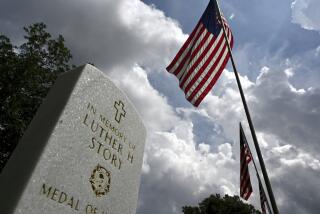A century and a half later, Gettysburg hero receives Medal of Honor
- Share via
Reporting from Washington — WASHINGTON — Lt. Alonzo Cushing and his artillerymen stood amid the smoke and noise of battle, trying to keep their cannons firing on the most consequential day of the Civil War.
It was the third and final day of a bloody fight in the fields and forests of Pennsylvania, which historians would call the Battle of Gettysburg. Cushing, respected by his men for his cool under fire, commanded the last cannon in his battery that was still firing.
More than 10,000 Confederate infantrymen stalked toward them in rows that stretched for a mile, although Cushing and his men could not see them. The soldiers of Pickett’s Charge had little more than haze and smoke for cover.
Cushing, who had served with distinction in earlier battles of the war, was struck by enemy fire that day — July 3, 1863 — but told his men he would continue to fight. He burned his thumb to the bone keeping his cannon firing, even as he was wounded in the shoulder and stomach.
Finally, with Gen. George Pickett’s troops only 100 yards away, he was killed by a shot to the mouth. At 22, Cushing became one of Gettysburg’s 51,000 casualties.
More than a century and a half later, in a ceremony at the White House on Thursday, President Obama bestowed the nation’s highest military distinction, the Medal of Honor, on the lieutenant.
“One hundred and fifty-one years ago, as our country struggled for its survival, President Lincoln dedicated the battlefield of Gettysburg,” Obama said. “Today, the nation that lived pauses to pay tribute to one of those who died there.”
During the crowded ceremony attended by Cushing family members, Obama handed the medal to Helen Loring Ensign, 85, Cushing’s cousin twice removed and his closest living relative. Obama was joined by Rep. Ron Kind (D-Wis.) and Rep. Jim Sensenbrenner (R-Wis.), who helped bring about Cushing’s award.
“This medal is a reminder that no matter how long it takes, it’s never too late to do the right thing,” Obama said.
The president credited Cushing for helping turn the tide of the decisive battle. Many historians regard the Union victory at Gettysburg as a pivotal moment that led to the Confederacy’s surrender in April 1865.
“It was thousands of unknown young soldiers, committing unsung acts of heroism, who saved our union, and freed a people, and reaffirmed our nation as one nation,” Obama said.
Cushing’s award is unusual. Most Medal of Honor recipients must receive the distinction soon after their service, the president said. He credited historian Margaret Zerwekh, who attended the ceremony, for the research and advocacy that resulted in Cushing’s medal.
Zerwekh first became interested in the artilleryman when she discovered she lived on a property in Wisconsin that had been owned by Cushing’s father. She spent 25 years petitioning on Cushing’s behalf, Obama said.
Cushing rests in the cemetery at West Point, where his tombstone reads: “Faithful Unto Death.”
matt.hansen@latimes.com
Follow Matt at @mtthnsn
More to Read
Sign up for Essential California
The most important California stories and recommendations in your inbox every morning.
You may occasionally receive promotional content from the Los Angeles Times.













